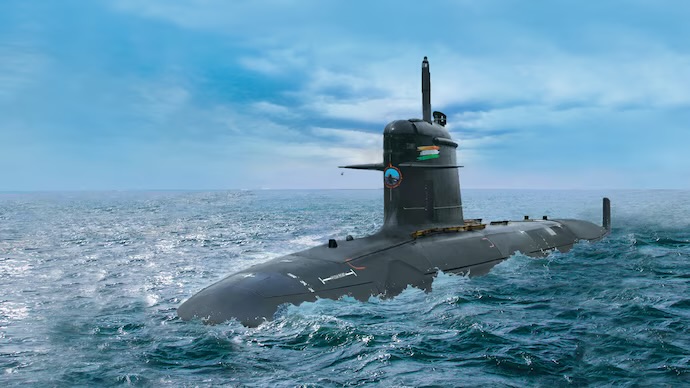India’s naval defense is set to receive a boost as the Indian Navy has approved a major project to build six advanced submarine. The state-owned Mazagon Dock Limited (MDL) has been given the green light to undertake this crucial project. This is estimated to cost around Rs 60,000 crore. This move is part of India’s broader strategy to strengthen its maritime capabilities in the Indian Ocean Region. Where the influence of China and Pakistan has been growing.
Strategic Importance of the Submarine Deal
The Indian Navy gave Mazagon Dock Limited (MDL) a big contract after testing submarines for Project 75 India. This project is very important for making India’s Navy stronger, especially since China and Pakistan are becoming more active in the Indian Ocean. Controlling this ocean is crucial for keeping the area safe and stable.
The contract shows that the Indian government wants to support public sector companies. By giving the job to MDL, the government hopes to create more jobs and develop new technology in India. This also supports the “Make in India” plan, which is all about making more things in India and buying less from other countries.
Partnership with Germany’s ThyssenKrupp
MDL will be working in collaboration with Germany’s ThyssenKrupp Marine Systems, a leading name in submarine technology. This partnership is expected to bring in advanced technology and expertise. This will enable India to build some of the most sophisticated submarines in the world. The project was highly competitive, with MDL and ThyssenKrupp competing against other major players, such as Larsen & Toubro and Navantia.
Advanced Submarines with AIP Technology
Under Project 75 India, MDL will be constructing six advanced conventional submarines equipped with an Air-Independent Propulsion (AIP) system. This technology represents a significant advancement over previous models. The AIP system allows submarines to stay submerged for longer periods without surfacing. By giving them a strategic advantage in stealth operations.
These new submarines will be diesel-electric attack submarines, larger and more advanced than the current fleet. The AIP technology will enable them to operate more silently and remain undetected. Thus making them a formidable addition to India’s naval arsenal.
Enhancing India’s Maritime Security
The development of these submarines is crucial for India’s maritime security. As the Indian Ocean Region becomes increasingly contested, having a robust submarine fleet will be key to maintaining a strategic edge. The new submarines will enhance India’s ability to patrol and protect its maritime interests. By including vital shipping lanes that are crucial for trade and energy supplies.
In addition to strengthening India’s naval capabilities, the project also has significant implications for the country’s defense industry. By involving domestic players like MDL, the government is fostering self-reliance in defense manufacturing. This will not only reduce dependency on foreign suppliers but also create opportunities. And technological innovation and skill development within the country.
Progress in India’s Nuclear Submarine Programme
Alongside Project 75 India, India’s nuclear submarine programme is also making significant strides. The Indian Navy will commission its second nuclear-powered ballistic missile submarine (SSBN), the INS Arighat, within the next two months. The INS Arighat, is currently under final trials and upgrades as required by the Indian Navy. It is also the second indigenously built SSBN of Indian Navy.
The commissioning of the INS Arighat will be a landmark achievement for India’s defense sector. It reflects the country’s growing capabilities in nuclear submarine technology and its commitment to enhancing its strategic deterrence.
Future Prospects
The approval of Project 75 India marks a significant step forward in strengthening India’s naval defense capabilities. By building six advanced submarines with AIP technology, India is not only enhancing its maritime security but also boosting its domestic defense industry. It is clear that the country is committed to develop nuclear submarine capabilities. And maintaining a strong and capable navy to protect its interests in the increasingly contested Indian Ocean Region.

